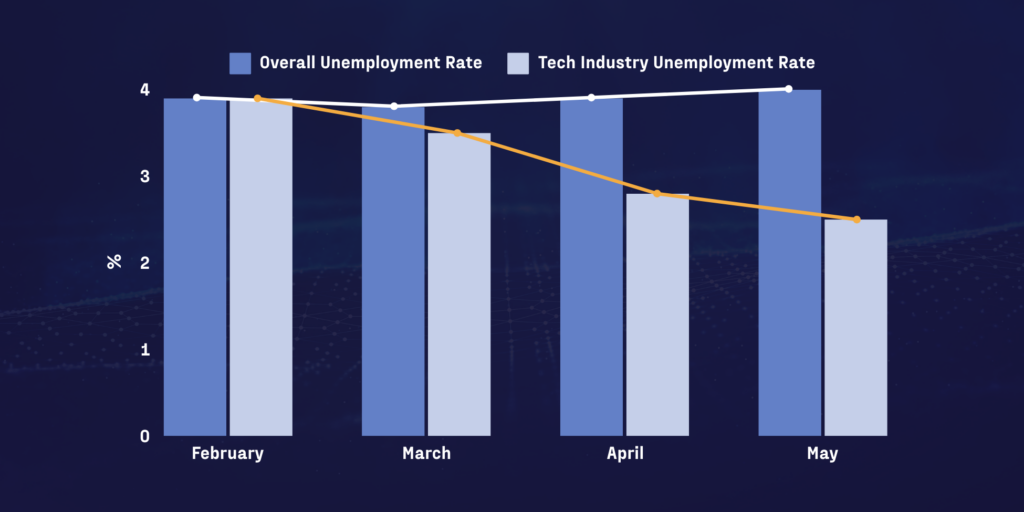What Is Reskilling?
Reskilling is the process of training your current employees in new, relevant skills to enhance the execution of their jobs. It usually involves a concerted effort by a business or organization to ensure its employees have useful, in-demand skills that will fulfill current and future business needs. Depending on the circumstances involved, it may also mean that employees are taught in-demand skills that are adjacent to the skills they are currently utilizing for their role.
Employees can learn new skills independently without their employer’s assistance however, reskilling is often done to ensure organizations have a robust pipeline of workers to accelerate sales and stay competitive. Moreover, your current employees are already well-skilled in your company processes meaning reskilling can take far less time than recruiting and hiring a new employee. Reskilling allows you to upgrade your team for digital transformation.
Benefits of Reskilling Your Current Employees to Fill Technical Skill Gaps
In today’s economy, businesses must reskill their employees to remain competitive. Indeed, there are many benefits to actively reskilling workers.
Fill Skill Gaps in Tech
All available evidence shows that there are massive skill gaps in technical roles. These skill gaps can create major problems for businesses, forcing them to increase pay or delay expansion due to a lack of labor. Furthermore, this problem compounds every year. According to a 2021 survey by Gartner, the skills employees need to be successful increase by 10% every year. In other words, reskilling is not something that employees can only do once and move on. It has to be an annual commitment.
Current unemployment levels further show the need to invest in reskilling to close skill gaps. The most recent data shows a 2.5% unemployment rate for technical roles, compared to the current unemployment rate of 4%.
This skill gap challenge is being noticed at all levels. Per a survey from McKinsey & Company, 87% of executives reported experiencing skill gaps in 2020, a number that is sure to rise over time as more employees retire. The World Economic Forum has noted that these trends are global. According to its estimate, more than 40% of workers globally will require reskilling by 2025.
This need for additional training presents major problems for employers, who suddenly need to find new and affordable ways to invest in their techforce to develop their skills. Fortunately, many successful technical reskilling options offer massive ROIs on their training dollars.
Reskilling Improves Morale
The benefits of reskilling go beyond filling needed gaps. When done properly, reskilling can enhance employee morale, creating a culture of value and investment in the workforce.
Layoffs negatively impact the morale of the employees who remain, as they may lose connections with valued colleagues and feel their jobs are in danger. Technical reskilling helps businesses avoid layoffs, by aligning current employees with the skill sets needed for newer, high-demand roles. By reskilling, organizations see a solid ROI (return on investment) compared to the money spent recruiting and training new hires.
Reskilling allows businesses to show that they value their employees. When an employer invests in reskilling, they show they are invested in employees’ long-term future. Reskilling allows organizations to minimize layoffs, training and deploying employee skills where needed most. Doing so builds loyalty, and commitment, and increases employee satisfaction.
Reduction in Turnover
With the volume of employers looking for high-quality tech workers, your business must prioritize reduced turnover and ensure that employee satisfaction remains high. Fortunately, reskilling has the added benefit of reducing turnover.
According to IBM, employees given access to training are 42% more likely to stay with a company long-term. The reasoning for this is relatively simple: employees view a business that creates a culture of continuous learning as a secure place to work. Employers that offer reskilling opportunities are seen as investing in employees’ long-term success, and individuals are far less likely to leave an employer invested in their future.
Reskill Your Employees With Per Scholas
Investing in reskilling can help your business build the skills your organization needs to succeed in your incumbent staff, improve workplace morale, and reduce turnover. The current tech talent shortage means reskilling employees is even more critical. However, reskilling is more than just one learning session. A reskilling partner who understands modern workforce challenges offers a robust array of courses and builds a customized program around your needs.
At Per Scholas, we offer all that and more. We can help you develop and implement a technical reskilling program that meets your business’s needs. Our educational offerings can contribute to reskilling your employees and creating a future-proofed roadmap that ensures a steady pipeline of diverse staff ready to take your business to the next level.
Want to learn more? Contact us today to learn how Per Scholas can help you reskill your employees.





